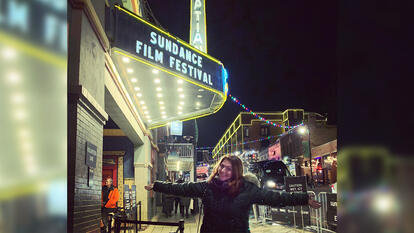Wellesley’s Wikipedia Edit-a-Thon Engages Students in Information Literacy Efforts

As part of the ongoing Newspapers on Wikipedia (#NOW) project on November 28, Wellesley students came together during their weekly community time for a Wikipedia edit-a-thon intended to create and improve the Wikipedia pages of newspapers from under-resourced communities. The vast majority of Wikipedia’s editors are male, so edit-a-thons that introduce women and nonbinary people to the process can help reduce Wikipedia’s editorial gender bias.
At the Wellesley event, which was open to the entire community, students of WellesleyPlus, a program for first-year, first-generation students directed by Rebecca Garcia, dean of the class of 2020 (M-Z), were joined by Eni Mustafaraj, assistant professor of computer science at Wellesley, and student researchers from her Cred Lab, which focuses on issues of online credibility and web literacy.
Garcia and Mustafaraj first connected when Mustafaraj and fellow CS 111 colleagues met WellesleyPlus students, hoping to spark their interest in computer programming and encourage students to take the course. Continuing with this partnership and as a part of a NSF CAREER research grant, Mustafaraj and Garcia organize biannual workshops for WellesleyPlus students, designed to build digital literacy skills.
Annabel Rothschild ’20, a member of Mustafaraj’s Cred-Lab and a co-organizer of the edit-a-thon, said, “It was so exciting to see the students energized by the immediate impacts of their edits; I think the event even doubled as a community building exercise because so many of the students were editing newspapers from their hometown, they were sharing anecdotes about home.”
Research published by Emma Lurie ’19 and Mustafaraj indicated that the presence of Wikipedia information on Google search results plays an important role in helping users assess the credibility of news sources on the web. Additionally, they discovered that only about one-third of U.S. based news publishers have a Wikipedia page.
Based on these findings, information literacy expert Michael Caulfield started the #NOW project to get students across the country to create 1,000 Wikipedia pages for local newspapers. Thanks to the generosity of Paul Haahr and Susan Karp, the #NOW project is currently part of a charity challenge: Every page completed by December 15 will result in a donation of $25 to Room to Read, a nonprofit that supports education and literacy programs for girls in the developing world.
“Wikipedia is a valuable site for the mass spread of information, and I learned that it is often one of the most used resources for knowledge in the developing world,” said Brittany Camp ’22, a student in the WellesleyPlus program. “As a philosophy major with an interest in international politics, this strikes me as an area for further research and development. It’s incredibly important, then, that we all do our part in updating this site for the benefit of the global ‘others.’”
In a previous edit-a-thon in October, the Cred Lab partnered with two Wellesley student organizations, Girl Up and Girls Who Code, to contribute to this charity challenge.
Anna Kawakami ’21, a member of the Cred Lab and co-organizer for both edit-a-thons, said the two events combined raised approximately $1,450, completing almost 60 pages. The events “really posed a win-win opportunity for students to not only empower themselves indirectly improving credibility of web sources, but also to give others the opportunity for empowerment through free education,” she said.
Mustafaraj said she is inspired by the concept of information environmentalism Caulfield has introduced, as a set of experiences to involve students to think about how to sustain a healthy information ecosystem.
“Similar to Wellesley’s Paulson Ecology of Place Initiative, I’m trying to build partnerships, like this was one with WellesleyPlus, to engage our community in digital sustainability experiences,” Mustafaraj said. “Adding knowledge to Wikipedia is like planting trees; it contributes toward fighting misinformation and pollution on the web, a place that belongs to all of us.”



